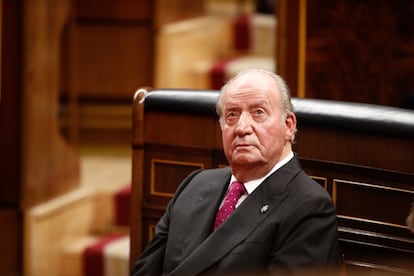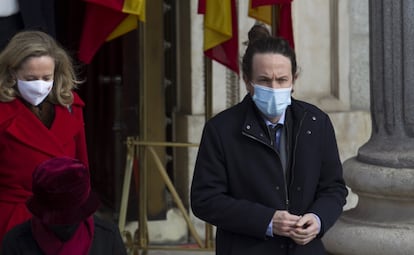Spain’s former king seeks to sort out tax affairs in third probe against him
Juan Carlos I allegedly used at least €500,000 in funds provided by a friend and failed to pay tax on that amount, which could constitute a crime

The legal team representing Spain’s former king Juan Carlos I has met with tax authorities in a bid to settle his financial situation in connection with an investigation into his alleged use of credit cards drawing from third-party funds. The transactions under scrutiny took place between 2016 and 2018, when the ex-monarch no longer enjoyed the immunity that he lost when he abdicated in 2014.
Legal sources said that the probe by anti-corruption prosecutors into undeclared revenues from opaque sources has shown expenses of over €500,000 in three tax years. In at least two cases, this could constitute a tax crime. Some of the funds used by Juan Carlos in 2016, 2017 and 2018 were drawn from bank accounts held by a personal friend, the Mexican businessman Allen Sanginés-Krause. The money was used to pay for hotels, trips and restaurant meals, among other expenses.

According to the investigation, the former monarch had access to those funds through an individual who acted as a go-between, the army colonel Nicolas Murga Mendoza. Prosecutors have questioned him and Sanginés-Krause regarding the use of these funds.
News of Juan Carlos’ attempt to regularize his tax situation was met with silence from the governing Socialist Party (PSOE) but open criticism from its coalition partner Unidas Podemos. “It’s a confession of tax fraud. He’s doing it because he got caught,” said Pablo Echenique, the parliamentary spokesperson for the leftist group.
Before the probe was sent to the Supreme Court, prosecutors determined that Juan Carlos and other members of his family (though not the current monarchs, Felipe VI and Letizia) spent a little over €500,000 in three years. The final amount could be more, as the investigation is not over, said the same sources.
Two other probes
Spain’s former king is already facing two other investigations by the Supreme Court. One involves alleged commissions for a contract that was awarded to a Spanish consortium to build a high-speed train to Mecca, but the events are prior to 2014 – before his abdication – and prosecutors are expected to drop the proceedings. The other probe is investigating Juan Carlos’ alleged ties to companies held in tax havens, but the former monarch has stated that these allegations are untrue, and his legal team is not particularly concerned about the investigation.
The tax probe, however, is being taken seriously because it could lead to criminal charges. A crime may have been committed on at least two of the three years under investigation, as no tax was paid on that income. When the due fee is more than €120,000, it is considered a tax crime.
Juan Carlos’ legal team is now trying to put his financial affairs in order in connection with these funds, as the ex-king could face tax crime charges when the investigation ends. According to the law, individuals who settle their tax situation before being formally notified of legal action will no longer be criminally liable. So far, neither the Spanish Tax Agency nor the prosecution’s office has filed a criminal complaint.
Settling with the tax authorities would mean paying at least 70% of the undeclared income, meaning around €350,000 based on the half a million euros in funds uncovered so far by the investigation into the ex-monarch’s credit card use. This amount is a fraction of what Juan Carlos has held in Swiss bank accounts for years.
In 2008, he received a gift of $100 million (€65 million at the exchange rate then) by Abdullah bin Abdulaziz, who was the king of Saudi Arabia at the time, according to documents obtained by Swiss justice officials from Arturo Fasana, the emeritus king’s wealth manager.
In June 2012, Juan Carlos emptied out his account at the Swiss bank Mirabaud, transferring all the funds to his former lover Corinna Larsen. He never declared that gift from the Saudi king to Spanish tax authorities – if he had, he would have owed tens of millions in gift tax. But Juan Carlos was still the reigning monarch and enjoyed immunity at the time of these events.
Juan Carlos, who reigned for nearly 40 years and guided the country through a peaceful transition to democracy following the death of dictator Francisco Franco, suddenly left Spain in August and his whereabouts remained a mystery for two weeks. In a letter released by the royal household, Juan Carlos said he was leaving due to the “public impact” on the Crown’s reputation of Swiss and Spanish investigations into his alleged financial irregularities. On August 17, the royal household confirmed that he is in the United Arab Emirates.
Earlier this year, Juan Carlos’s son, King Felipe VI, renounced any inheritance that he could receive in the future from his father after allegations of financial impropriety surfaced, and he also stripped the emeritus king of the stipend he receives.
Spending other people's money
Spending someone else’s money without declaring it to the tax authorities, even when the money is a gift, could constitute a crime if the unpaid tax – whether from undeclared revenue or an undeclared donation – comes out to more than €120,000. In the Madrid region, where Juan Carlos has his tax residence, donations among family members enjoy significant deductions and are only taxed at 1%. But in this case, the money allegedly spent by Juan Carlos did not come from a relative, but from a wealthy friend.
With reporting by Xosé Hermida.
English version by Susana Urra.
Tu suscripción se está usando en otro dispositivo
¿Quieres añadir otro usuario a tu suscripción?
Si continúas leyendo en este dispositivo, no se podrá leer en el otro.
FlechaTu suscripción se está usando en otro dispositivo y solo puedes acceder a EL PAÍS desde un dispositivo a la vez.
Si quieres compartir tu cuenta, cambia tu suscripción a la modalidad Premium, así podrás añadir otro usuario. Cada uno accederá con su propia cuenta de email, lo que os permitirá personalizar vuestra experiencia en EL PAÍS.
¿Tienes una suscripción de empresa? Accede aquí para contratar más cuentas.
En el caso de no saber quién está usando tu cuenta, te recomendamos cambiar tu contraseña aquí.
Si decides continuar compartiendo tu cuenta, este mensaje se mostrará en tu dispositivo y en el de la otra persona que está usando tu cuenta de forma indefinida, afectando a tu experiencia de lectura. Puedes consultar aquí los términos y condiciones de la suscripción digital.








































